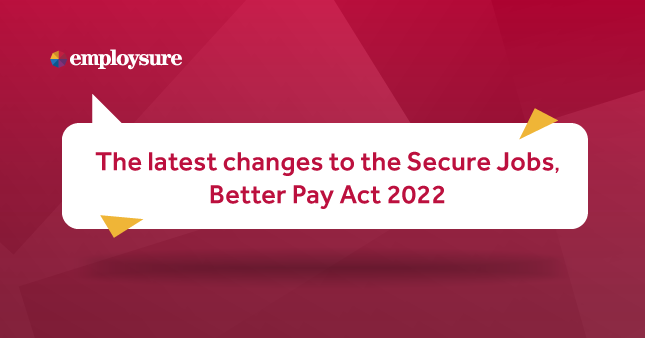
The Secure Jobs, Better Pay Act is the biggest employment law reform since the Fair Work Act first came into effect in 2009. To keep your business up to date, here is a roundup of the changes.
Why is Secure Jobs, Better Pay being implemented?
The Fair Work Act sets minimum standards and conditions for Australian employers, while also providing the legal framework for employer-employee relations.
The Secure Jobs, Better Pay Act is intended to update the Fair Work Act so that it properly represents the nation’s most pressing employment issues. In particular, the Act has a strong focus on improving gender equality and job security.
What is changing?
The Secure Work, Better Pay Act is an extensive package of reforms. Beneath is a list of the most significant amendments, which have either already come into effect or will soon.
Gender equality
Gender equality has now been given the same weighting as objectives like productivity and economic growth in the workplace relations framework.
✔ Gender equality will be an objective when minimum wages for different awards are set during the Annual Wage Review, helping to eliminate gender pay gaps.
Discrimination
The Fair Work Act has been amended to include gender identity, intersex status, and breastfeeding in its list of protected attributes.
✔ All these protected attributes are included in provisions for discriminatory terms in agreements, awards, and general protections.
Sexual harassment
Amendments are aimed at protecting workers, prospective workers, and employers from sexual harassment in the workplace.
✔ With the agreement of both parties, the Commision can now intervene in unresolved sexual harassment disputes, with the authority to issue orders and compensation.
Pay secrecy clauses
Amendments to the Fair Work Act prohibit pay secrecy clauses and provide employees with a right to disclose or not disclose their remuneration.
✔ This applies to all new or revised employment contracts and written agreements from the 7th of December 2022.
Unpaid parental leave
The National Employment Standards have been adjusted to provide eligible employees with additional entitlement to unpaid parental leave.
✔ Employees taking 12 months unpaid parental leave can request an extension of a further 12 months leave (unless their partner has already taken 12 months of leave).
✔ Unresolved disputes about extension requests can now be processed by the Commision if an agreement cannot be reached.
Fixed-term contracts
Amendments to the Fair Work Act limit the use of fixed-term contracts for the same role beyond two years or two consecutive contracts – whichever is shorter. This also applies to contract renewals.
✔ Where a fixed-term contract is made in breach of the new laws, the employee will be considered a permanent employee.
✔ The employee will retain the terms and conditions of their fixed-term contract, while gaining access to relevant safety net provisions including:
Entitlements to notice of termination and redundancy payments.
Access to unfair dismissal proceedings.

Do you understand the sexual harassment reforms?
New legislation protects workers, prospective workers, and employers from sexual harassment. Find out what you need to know about these reforms with our FREE Factsheet.
Small claims procedures
Amendments are intended to assist workers in recovering their unpaid work entitlements via small claims court procedures.
✔ The cap on the amount that can be awarded through small claims court proceedings has been raised from $20,000 to $100,000, making the small claims procedure available to more workers.
Enterprise agreements and bargaining
Enterprise agreements lay out employment conditions, including pay rates and leave entitlements, for up to 4 years from the date of approval.
Amendments to the Fair Work Act support the bargaining stream for enterprise agreements, helping employees initiate the bargaining processes.
✔ If an employer refuses to bargain the terms of an enterprise agreement, employees can push their employer to engage in good faith enterprise bargaining by applying to the Commission for bargaining orders.
✔ Amendments permit an employee or employee organisation to apply to the Commission for a variation to an existing single-enterprise agreement.
✔ The Commission now has the powers to correct errors in enterprise agreements as they see fit. Employers, employees, and unions covered by an agreement can also apply to the Commision for corrections.
Secure Jobs, Better Pay – Key Dates
Key start dates for changes under the Fair Work Act Legislation (Secure Jobs, Better Pay) Act 2022:
| Date | Changes |
| 7th of December 2022 | ✔ Gender equality and job security added as objectives to the Fair Work Act. ✔ Pay secrecy provisions removed. ✔ New protected attributes added for breastfeeding, gender identity, and intersex status. ✔ The Fair Work Commision has powers to correct enterprise agreements and intervene in enterprise bargaining processes. |
| 7th of January 2023 | ✔ Job advertisements banned from including pay rates that breach the Fair Work Act, Awards, and enterprise agreements. |
| 6th of March 2023 | ✔ The Fair Work Commision can intervene in unresolved sexual harassment disputes. |
| 6th of June 2023 | ✔ Changes to requests for extended parental leave, offering increased employee access. |
| 1st of July 2023 | ✔ Increase in monetary cap for unpaid wages claims. |
| 6th of December 2023 | ✔ Limitations on fixed-term contracts. |
Do the Fair Work Act amendments raise any concerns in your company? If you own an Australian business and have issues surrounding workplace relations or health and safety, call our free 24/7 Advice Line on 1300 651 415 to speak with an Employsure expert.
